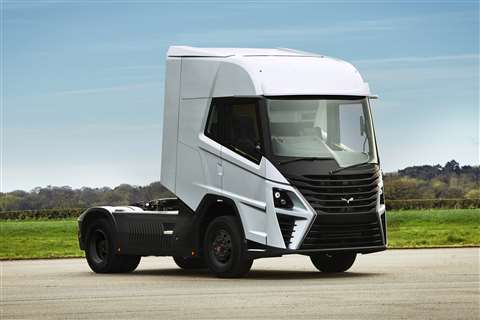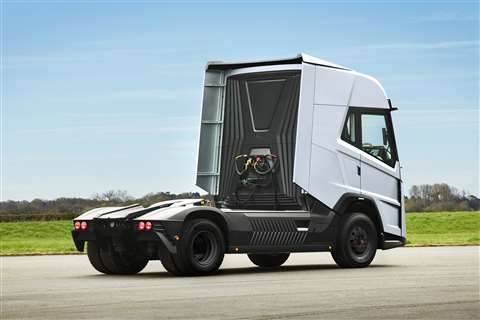Hydrogen-electric heavy-duty truck from HVS
18 April 2023
Hydrogen Vehicle Systems (HVS) is a new OEM in the heavy-duty commercial vehicle segment
 The new HGV is built by Hydrogen Vehicle Systems (HVS) a UK-based hydrogen vehicle OEM. (Photo: HVS)
The new HGV is built by Hydrogen Vehicle Systems (HVS) a UK-based hydrogen vehicle OEM. (Photo: HVS)
Hydrogen Vehicle Systems (HVS) has unveiled a clean-sheet-designed hydrogen-electric Heavy Goods Vehicle (HGV). The company said that by showcasing its hydrogen powertrain in the form of a 40-tonne technology demonstrator, it has underlined its objective of being the first indigenous UK designed and developed hydrogen-electric HGV on the market.
Founded in 2017, in Glasgow, Scotland, HVS focuses on the ground-up design and development of zero-emission hydrogen-powered commercial vehicles. The company is comprised of industry specialists, with experience in the automotive, energy, hydrogen technology, power electronics, sustainability and environmental management fields.
Along with funding from the Advanced Propulsion Centre, Innovate UK, Scottish Enterprise and Energy Technology Partnership, HVS said its strategic investment partner is the UK-based service station and grocery corporation, EG Group, offering hydrogen refuelling infrastructure, fleet customer base and the potential for global scalability.
“We are delighted to reveal our 40-tonne HGV,” said Jawad Khursheed, CEO of HVS. “This technology demonstrator showcases our ground-breaking hydrogen-electric commercial vehicle design and advanced powertrain technology. Our zero-emission trucks are a key part of decarbonising the logistics sector. Hydrogen is the perfect fuel for the haulage industry, offering long ranges and quick refuelling thanks to stations being easily integrated into existing key transport networks. What’s more, we will supply our customers with the most advanced HGV in the sector delivering a step change in driving experience and efficiency.”
HVS said its tractor units will be built on an all-new chassis, designed around the hydrogen powertrain. It was developed in-house by Pete Clarke, head of design.
The powertrain employs a fuel cell system and energy storage system to deploy electricity to an electric motor to transmit power to the wheels. It uses the KERS (Kinetic Energy Recovery System) to recapture energy under braking and while the truck is slowing down. The integrated powertrain is controlled with the company’s advanced control system, SEMAS, which monitors interactions between drivers and control systems, delivering class-leading fuel efficiency and durability.
The company said the fuel cell permits longer range, higher load-carrying capacity, and faster refuelling than would be possible using battery-electric technology alone: typical refuelling time is comparable to diesel, around 20 minutes to replenish the high pressure hydrogen tanks.
 The makers said the HGV is the first indigenous UK designed and built heavy hydrogen truck. (Photo: HVS)
The makers said the HGV is the first indigenous UK designed and built heavy hydrogen truck. (Photo: HVS)
It is in the long-distance HGV segment that hydrogen fuel cells offer the most advantages, said the company.
The only emission from the vehicle is water vapor, meaning there are no harmful greenhouse gas emissions of any kind.
Depending on the journey – the route travelled, road conditions and driving style – HVS said the HGV has the capacity to travel up to 370 miles (600 km).
Hydrogen-powered vehicles don’t need charging like a battery-powered electric vehicle. They are refuelled with hydrogen gas, stored at pressure in hydrogen cylinders. Refuelling takes a much shorter time than charging an equivalent battery vehicle and is comparable to filling a truck with diesel (about 15 to 20 minutes).
In the future, many hydrogen fuelling stations will be located at existing commercial vehicle forecourts, using dispensers that look very similar to conventional petrol and diesel ones, but with a different nozzle.
Headquartered in Glasgow, HVS is undertaking development work at Horiba Mira in Nuneaton, Warwickshire, England.
The company said it plans to open an R&D, engineering and pilot production facility alongside a permanent UK-based production facility. It anticipates hiring a workforse of 600 across all key disciplines, with many recruits coming from the automotive and aerospace industries.
Other variants of the hydrogen-fuelled 4x2 HGV tractor unit, including a left-hand drive variant, are also in the pipeline.
STAY CONNECTED




Receive the information you need when you need it through our world-leading magazines, newsletters and daily briefings.
POWER SOURCING GUIDE
The trusted reference and buyer’s guide for 83 years
The original “desktop search engine,” guiding nearly 10,000 users in more than 90 countries it is the primary reference for specifications and details on all the components that go into engine systems.
Visit Now
CONNECT WITH THE TEAM










